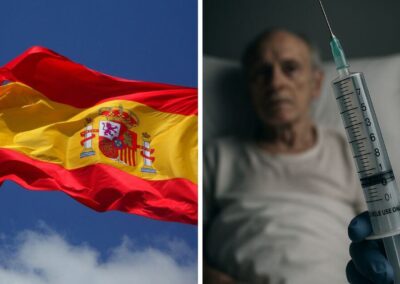The Health and Social Care Select Committee has been accused of “rigging” their assisted suicide inquiry after all five of the panellists who presented to their latest evidence session supported assisted suicide.
Those presenting to MPs in the session included Silvan Luley, who is a team member of Dignitas. Dignitas is a Swiss membership organisation that advocates for, and provides, assisted suicide. According to its own figures from 2020, a British person travelled to Switzerland every eight days to end their life and over 1,500 Britons are currently members of the organisation.
Mr Luley has criticised the UK Government’s position on assisted dying stating that “The politicians … only focus on their egoistic motives to maintain their power, financial interests and paternalistic dogmas”. He has argued for assisted suicide as a means of suicide prevention and gave evidence to the UK Committee on Assisted Dying in 2010-11.
“Suicide due to old age”
Bernhard Sutter, CEO of Switzerland’s biggest assisted suicide membership organisation EXIT, also addressed MPs. Mr Sutter has argued that assisted suicide laws are necessary to “prepare for the impending democratic crunch in developed countries: an ageing population and a multitude of problems at the end of people’s lives.”
CEO since 2007, Mr Sutter presided over a change in EXIT’s statutes in 2014 to allow for “suicide due to old age”, removing the condition that a person had to be terminally ill in order to request an assisted suicide.
He has also said that he would be “happy” to see the UK change its assisted suicide laws.
“It’s about controlling my own death”
Further contributions were provided by Swiss medics and professors including geriatrician Dr Georg Bosshard. Dr Bosshard provided evidence in the 2010-2011 UK Committee on Assisted Dying and argued that palliative care will not remove the desire for assisted suicide because “assisted dying is a matter of self-determination”. There are many patients for whom “it’s not about pain and symptoms … it’s about controlling my own death”.
Speaking alongside him was Dr Yvonne Gilli. Dr Gilli is president of the Swiss Medical Association and was a Member of Swiss Parliament from 2007 – 2015 representing the Green Party. In 2009, the Green Party rejected a consultation by the Federal Council to introduce a ban on assisted suicide stating that they “defend the point of view that organized assistance in suicide responds to a certain extent to a need of society”.
Further evidence was provided by Professor Samia Hurst-Majno. She is Professor of Biomedical Ethics at the University of Geneva and a member of the Swiss National Advisory Commission on Biomedical Ethics.
During the evidence session, she made comments that indicate that she is supportive of legalising assisted suicide. This included arguing that the point often made by disability rights advocates that a ban on assisted suicide helps protect the vulnerable is incorrect, stating it was an illusion that banning assisted suicide protects vulnerable people. This comment was subsequently lauded in a press release issued by assisted suicide pressure group My Death, My Decision.
Organisations that financially benefit from assisted suicide have vested interests
Right To Life UK spokesperson Catherine Robinson said “It’s very concerning that it appears that the Health and Social Care Select Committee continues to be rigging their assisted suicide inquiry with all five of the panellists who presented to this latest evidence session supporting assisted suicide”.
“Evidence from countries where assisted suicide is already legal can provide a vital insight into the ramifications of such legislation”.
“However, when the evidence is provided by organisations that financially benefit from assisted suicide, it is extremely unlikely that unbiased information will be presented. Such organisations have vested interests in greater provision of euthanasia and assisted suicide”.
“The Government inquiry must seek evidence from Swiss organisations and individuals who are against the practice of assisted dying and assisted suicide to ensure a comprehensive view is taken”.












